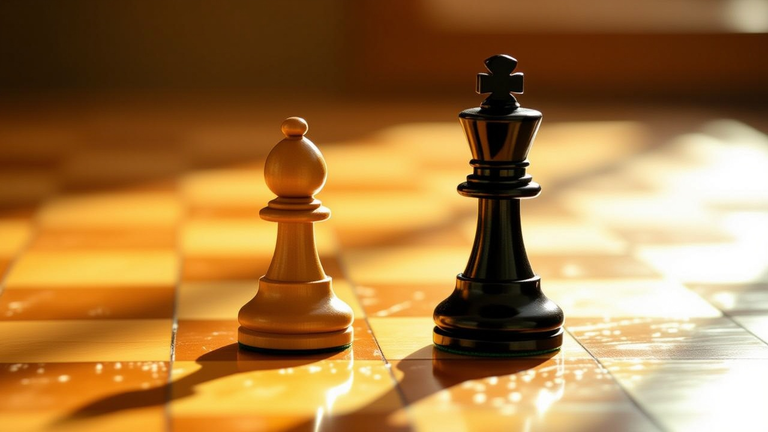Life Is Like Chess [Esp] [Eng]
La vida es como el ajedrez (aunque a veces nos sintamos como peones)

image generated with hive's AI - imagen generada con la IA de hive
No soy un gran jugador de ajedrez, ni mucho menos. De hecho, la mayoría de las veces pierdo antes de darme cuenta de qué hice mal. Pero hay algo en ese juego tan antiguo y tan serio que me hace pensar en cómo se parece mucho a la vida. Tal vez suene a cliché, pero déjame explicarte.
En el ajedrez, como en la vida, no todo depende del azar. No hay dados, no hay cartas, no hay suerte. Hay un tablero, piezas, y reglas claras. Lo que cambia es la estrategia. Tus decisiones. Tus movimientos. Y eso ya dice bastante.
Por ejemplo, todos comenzamos la partida con las mismas piezas: rey, reina, alfiles, caballos, torres y ocho humildes peones. Pero, a medida que avanza el juego, cada quien empieza a perder cosas. Igual que en la vida. Algunos pierden piezas importantes desde el principio. Otros logran proteger a su reina hasta el final. Y otros… bueno, otros pierden muy rápido y tienen que volver a empezar.
Lo interesante es que el peón, esa pieza pequeña que parece no tener mucha fuerza, puede convertirse en reina si logra llegar al otro lado del tablero. Y eso me encanta. Porque es como decir: quizás hoy te sientes pequeño, limitado, sin muchas opciones… pero si sigues avanzando, paso a paso, algún día podrías transformarte en algo mucho más grande.
También está eso de pensar antes de moverse. En ajedrez, actuar sin pensar suele llevarte directo a la derrota. En la vida… bueno, también. Muchas veces tomamos decisiones impulsivas y luego nos arrepentimos. No siempre tenemos todo el tiempo del mundo para reflexionar, pero sí podemos aprender a anticipar. A leer el tablero. A entender cuándo es momento de avanzar y cuándo es mejor retroceder.
Y ojo: a veces hay que sacrificar una pieza para ganar una mejor posición. ¿Te suena? En la vida también hay momentos en los que debemos dejar algo atrás para poder seguir adelante. Puede ser un trabajo, una relación o una zona de confort. No porque no tenga valor, sino porque hay algo más importante que estamos buscando.
Otra cosa que me hace pensar es que, en el ajedrez, no puedes jugar solo. Necesitas un oponente. Alguien que te desafíe, que te haga pensar, que te obligue a mejorar. En la vida también necesitamos eso. Personas que nos reten, que nos saquen de la rutina, que no nos dejen estancarnos. No siempre son agradables, pero muchas veces son necesarias.
Y por último, el rey. En ajedrez, si pierdes al rey, el juego se termina. Todo gira en torno a protegerlo. En la vida, cada persona tiene su propio "rey": puede ser tu paz interior, tus valores, tu familia, tus sueños, tu propósito. Lo importante es no perderlo de vista.
Life Is Like Chess (Even If We Feel Like Pawns)
I'm not a great chess player—not even close. Most of the time, I lose before I even realize what I did wrong. But there’s something about this old and serious game that makes me think about how much it resembles life. Sounds cliché? Maybe. But hear me out.
In chess, like in life, not everything depends on luck. There are no dice, no cards, no spins. You get a board, pieces, and clear rules. What makes the difference? Strategy. Your decisions. Your next move. And that already says a lot.
We all start with the same pieces: king, queen, bishops, knights, rooks, and eight humble pawns. But as the game goes on, each player starts losing pieces. Just like in life. Some people lose important things early on. Others protect their queen until the end. And some… well, some lose fast and need to start over.
What's interesting is that the pawn—that small piece that doesn’t seem like much—can become a queen if it reaches the other side of the board. And I love that. Because it’s like saying: maybe today you feel small, limited, with no real options... but if you keep moving forward, step by step, you might turn into something much greater.
Then there's the idea of thinking before moving. In chess, acting without thinking usually ends in defeat. In life… yeah, same thing. We often make impulsive choices and regret them later. We may not always have unlimited time, but we can learn to anticipate. To read the board. To understand when to push forward and when to fall back.
And here’s the thing: sometimes you have to sacrifice a piece to gain better position. Sound familiar? In life, there are moments where we must let go of something to move on—maybe a job, a relationship, or just comfort. Not because it’s worthless, but because something more meaningful is ahead.
Another thing: you can’t play chess alone. You need an opponent. Someone to challenge you, to push you, to make you think. Life's like that, too. We need people who challenge us, who keep us sharp, who help us grow. They’re not always pleasant—but they’re often necessary.
And finally, the king. In chess, if you lose the king, the game is over. Everything revolves around protecting it. In life, each person has their own “king”: it could be your inner peace, your values, your family, your dreams, your purpose. The important thing is not to lose sight of it.